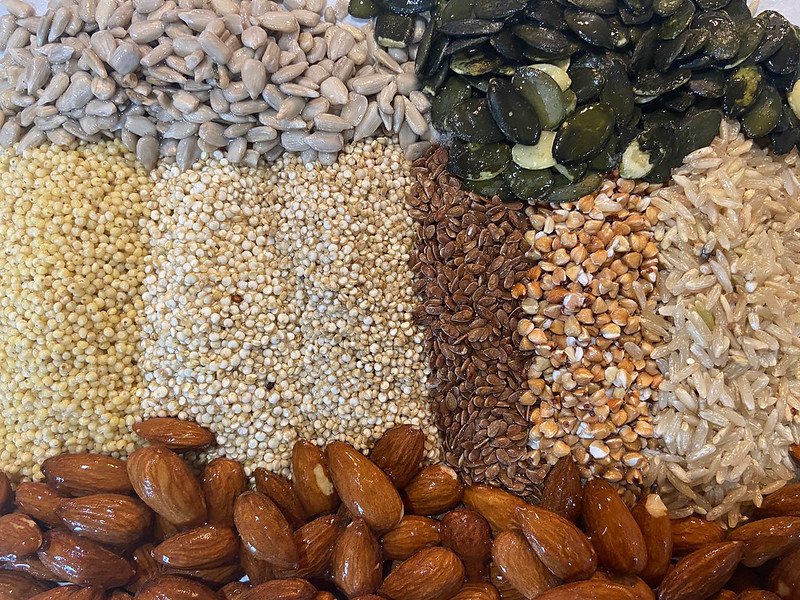OSU study: A cold soak lowers the risk of salmonella growth on ‘sprouted’ foods

CORVALLIS, Ore. (KTVZ) – Soaking “sprouted” foods in cold water, rather than the more common practice of soaking at ambient temperature, lowers the risk of salmonella growth on these increasingly popular healthy snack foods, according to an Oregon State University study.
Making these foods involves soaking raw ingredients — usually grains, nuts or seeds – in water overnight, often at room temperature. Soaking softens the hulls and leads to swelling that initiates the activation of enzymes and reduction of antinutrients, which are plant compounds that reduce the body's ability to absorb essential nutrients.
Following soaking, these ingredients are typically dried under low temperature and low humidity to maintain their “raw” label, then packaged as either single-ingredient snacks, incorporated into a complex snack – such as granola, bars or trail mix – or pureed into nut or seed butters or as a base for fermented non-dairy “cheeses.”
The study, published in Food Protection Trends, demonstrates the risk of “sprouting” practices and presents practical strategies to improve safety of these raw foods, said Joy Waite-Cusic, associate professor of food safety systems in OSU’s College of Agricultural Sciences.
“If this soaking phase happens at ambient temperature, then there is a significant food safety problem,” said Waite-Cusic, who is also OSU Extension’s statewide specialist for home food safety and food preservation in the College of Public Health and Human Sciences. “This study provides regulators with clear guidance on the risks associated with this new category of ‘sprouted’ products.”
These foods aren’t really “sprouted” – meaning the root doesn’t actually emerge from the seed, Waite-Cusic explained. And many of the ingredients used in “sprouted” products have been associated with a number of recalls and foodborne illness outbreaks in recent years.
“Because they’re raw and minimally processed they are more likely to carry pathogens,” Waite-Cusic said. “The ambient-temperature soaking process creates conditions that are ripe for salmonella growth. A lot of people are making ‘sprouted’ foods at home, so there’s no reason the same risk doesn’t occur there.”
Grains, nuts and seeds are significant ingredients in the healthy snack segment due to their high-quality protein and “healthy” fats, along with abundant antioxidant, fiber, and mineral content. New products including grains, nuts and seeds that are “sprouted,” “awakened,” and “activated” are perceived to provide added value, Waite-Cusic said.
The first objective of the study was to demonstrate the potential for salmonella to grow during the soaking period. A secondary objective was to determine easily implementable and cost-effective controls, such as refrigeration or adding salt during the soaking period to prevent salmonella growth.
For their study, the OSU researchers tested 15 minimally processed grains, nuts and seeds that were either purchased from grocery stores or supplied by local food companies. The foods were inoculated with a “cocktail” that included six salmonella strains associated with tree nut and peanut products. The inoculated grains, nuts and seeds were dried at ambient temperature for 24 hours to return them to their original moisture content.
Next, they soaked the inoculated grains, nuts and seeds in either distilled water or salt solutions at various concentrations and temperatures for 24 hours. Also soaked was the control group of uninoculated grains, nuts and seeds.
At ambient temperature in non-salted water, salmonella populations significantly increased during the soaking of almonds, cashews, hazelnuts, peanut and buckwheat. Significantly less growth was measured in hemp, brown rice and flax.
“The potential for grains, nuts and seeds to be contaminated with low levels of salmonella or other foodborne pathogens is a significant risk,” Waite-Cusic said. “However, the risk for foodborne illness increases significantly if processing steps support the proliferation of these pathogens.”
This study is intended to provide information for both the industry and regulators, according to Waite-Cusic.
“Through our conversations with industry partners, including salt in the soaking process and refrigeration were determined to be the most cost-effective and easily implementable options for modifying current procedures,” she said.
